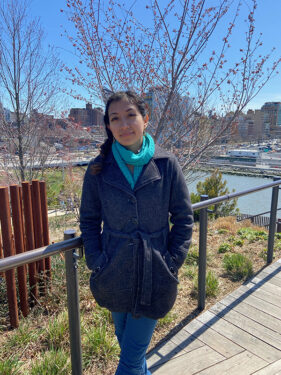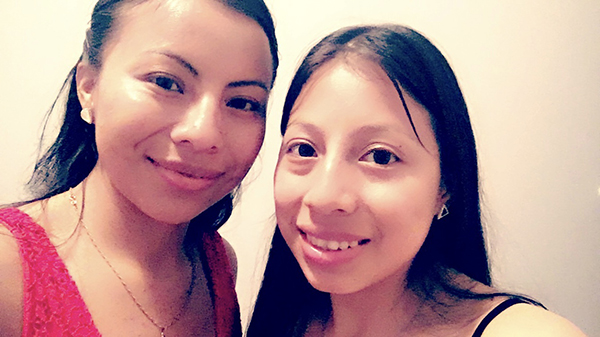
‘A lot of us work hard and we pay taxes’
CORONA — Jessica Astudillo was in high school before she learned she was an undocumented immigrant.
Growing up in Corona, she had a keen interest in science and had taken AP courses in biology and chemistry. “As a child, I’d rather do a science experiment than play with a Barbie doll,” she recalled. But when she wanted to apply for internships at medical firms, she couldn’t. The applications required a Social Security number and Astudillo didn’t have one.
That’s when she found out she wasn’t born in the U.S. Her parents, Cesar and Diana Astudillo, sat her down and told her the truth — they were undocumented immigrants who brought her to America from their native Ecuador when she was two years old.
She has no memory of Ecuador and has known no other home than the U.S. Her family lived in Corona and attended Mass at St. Bartholomew Church in Elmhurst.
Astudillo applied for Deferred Action for Childhood Arrivals status as soon as then-President Barack Obama signed the executive order creating the program in 2012. She was granted DACA at age 19 when she was a student in the Macaulay Honors College of the City University of New York.
Astudillo, who is now 29, is one of hundreds of thousands of DACA recipients in the U.S. whose lives are always clouded by an air of uncertainty due to the program’s fluctuating legal status.
She firmly believes Congress should take action to protect DACA recipients from deportation, and has often spoken out about the issue. In fact, she was one of the speakers at a DACA 10th anniversary rally sponsored by the New York Immigration Coalition in Battery Park on June 15.
“A lot of people don’t realize the issue is a lot closer to them than they think. Most of us grew up being your neighbors, being your public servants — your doctors and nurses. And I think that it’s not a far stretch to say we belong here,” Astudillo said.
When Astudillo mentions that there are DACA recipients who are doctors, she could be talking about herself; she is currently a pediatrician at NYU Langone Health.
Like Astudillo, other DACA recipients talk of living with a sense of unease.
Lesli Tiu thought she would be able to breathe easier once she was granted DACA status, but that hasn’t turned out to be the case. While she is grateful for DACA, the possibility of deportation is always in the back of her mind.
Tiu, 27, a native of Guatemala, came to the U.S. in 2007 at age 12 and now serves as the parish secretary at Presentation of the Blessed Virgin Mary Church in Jamaica.
“I’m a mother. I worry if I am deported, how can my children live without me here to take care of them?” she said. Her two children were both born here. As a result, they are U.S. citizens and are not in danger of being deported.
“A lot of people who have DACA, they came here not because they wanted to, but because their parents brought them. They saw that America has more opportunities than their old country. If I go back to my country now, what am I going to do?” she said.
“Congress should pass a law. A lot of us work hard and we pay taxes. We do the right thing,” Tiu added.

At the age of 12, Tiu survived a long, grueling journey to the U.S with her younger sister Meilyn, who was 10, from their home in Guatemala by way of Mexico. Her parents, Juana and Rolando Tzunun, had already arrived in America and settled in Jamaica, Queens. “They sent for us to join them,” Tiu recalled.
Once in America, the family’s life revolved around church. Almost as soon as they arrived in Queens, The Tzununs started attending Mass at Presentation of the Blessed Virgin Mary Church.
Tiu heard about DACA from news reports when she was a senior in high school and decided to apply. A major factor in that decision: she was rejected for a college scholarship because she was an undocumented immigrant.
“If you don’t have a Social Security card, you can’t apply for things. I went to the financial [aid] office and said, ‘Can you help me?’ And they said, ‘Sorry, we would offer you a scholarship. But in your situation, we can’t,’” she recalled.
The DACA application process was lengthy. “For me, it took a long time; I waited for months to hear back,” she said.
Tiu said that what got her through that seemingly endless waiting period was her faith. “I prayed to God to help me,” she said. “And He did.”
